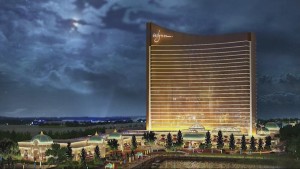Did one of the biggest decisions in Boston development history hinge on a tawdry deception?
That’s the question in the wake of revelations that Steve Wynn went to great lengths to keep an alleged sex abuse scandal from being uncovered by investigators for the Massachusetts Gaming Commission.
Wynn stepped down last week from the iconic, global casino brand he built over several decades. Wynn’s departure came after it was learned he had for years kept secret a $7.5 million sexual abuse settlement from the prying eyes of Massachusetts regulators.
So when the commission cleared the Las Vegas billionaire to compete for the Boston-area casino license back in 2013, it had not a clue about the sordid settlement or, for that matter, myriad other sexual abuse allegations about Wynn that have since emerged.
In fact, the report filed by the MGC’s investigative team found Wynn to be “highly ethical,” a “perfectionist” casino owner and hotelier.
Nine months later, Wynn edged out a joint bid by Mohegan Sun and the owners of Suffolk Downs, who controlled a valuable tract straddling East Boston and Revere, in a hotly contest competition that left the hometown bidders crying in their beer.
The loss all but doomed Suffolk Downs, which had been the showcase of horse racing in New England since the 1930s, ending decades of
lobbying by its owners for either slot machines or a casino in order to subsidize the track.
As we all now know, the owners of Suffolk Downs went on to cut a deal last year with top Boston-developer Tom O’Brien, who plans to develop the sprawling old track into a massive new neighborhood of homes, offices and shops. Meanwhile, Wynn went on to build a $2.4 billion casino tower on the Boston line in Everett; it is currently on schedule to open next year.
But what if the MGC’s Investigations and Enforcement Bureau had uncovered evidence of Wynn’s alleged pattern of sexual abuse and misconduct when it was conducting its background review of the billionaire? Might that have tipped the scales in favor of Mohegan Sun and Suffolk Downs and away from Wynn?
“The short answer is yes,” said Clyde Barrow, chairman of the political science department at the University of Texas-Rio Grande Valley and a long-time observer of the gaming market in the Northeast.
Barrow points to the decision by Caesars, one of the nation’s top casino companies, to pull out of the competition for casino license Massachusetts in late 2013. The move came amid a pending recommendation by MGC investigators that Caesars be disqualified. The offence: a branding/naming deal for one its hotels with Gansevoort, a boutique luxury hotel firm, which had a principal with alleged ties to the Russian mob.
“It is always difficult to go back and retrospectively reassess what might have happened, but we certainly know what happened to Caesars, which in my view was a much less egregious offense,” Barrow said.
Hidden Settlements and Mafia Ties
Who knows whether multimillion-dollar sexual abuse settlement would have been enough on its own to torpedo Wynn’s bid, especially given the new fervor for ensuring such claims are taken seriously and acted upon.
Wynn had other problems at the time. Wynn Resorts had agreed to buy the former chemical plant site in Everett for $75 million. But during the MGC’s suitability review of Wynn’s background in late 2013, gaming investigators discovered that the owners of the land Wynn Resorts had agreed to buy included a convicted felon.
Wynn denied having any knowledge of the unsavory background of the real estate partnership. State gaming regulators ordered a do-over, with Wynn cutting the price down to $35 million to prevent any profits from potentially flowing into the wrong hands.
Federal prosecutors also later charged the members of the Everett ownership group with hiding the involvement of a convicted criminal from both state regulators and Wynn Resorts. All three were later acquitted.
Nonetheless, the land mess provided endless ammunition to opponents of Wynn’s casino proposal – above all to supporters and surrogates for Mohegan Sun, which was locked in a vicious battle with Wynn for the Boston-area casino license.
Over the next few years, Wynn weathered a titanic legal and political battle with Boston Mayor Marty Walsh, who has supported having a casino at Suffolk Downs but had no interest seeing it built in neighboring Everett. There was also endless state environmental reviews which, combined with the legal battling, pushed off the groundbreaking for the project for two years.
All that was fading fast as we entered 2018, with the Wynn Boston Harbor, despite its name, fast taking shape on the banks of the turgid Mystic River.
Then along came the earthshaking Jan. 26 Wall Street Journal scoop,, which detailed the $7.5 million settlement and painted a picture of widespread sexual abuse by Wynn based on interviews with 150 current and former employees.
Not long after Karen Wells, head of the commission’s investigations bureau, reported that Wynn Resorts’ general counsel acknowledged that Steve Wynn was advised not to disclose the multimillion-dollar settlement to her investigators.
But he did more than just not disclose – which would have been a kind of don’t ask, don’t tell approach. Wynn had set up a private LLC through which to funnel the money in order to keep the deal secret, the Journal reported.
The MGC has reacted to the disclosure by ramping up its review, with the possibility remaining that Wynn Resorts could still lose its license to operate its Everett casino even with the departure of Steve Wynn.
A Grand Deception
It’s unlikely that Mohegan Sun will get a shot to take over the project at this point; Wynn Resorts would have great sway over who gets the license, even if the MGC were to take it from Wynn, which isn’t the most likely outcome..
Still, it makes you wonder what might have been had Wynn been forced to air all of his dirty laundry more than four years ago when the fate of the Boston area casino license was up in the air. Mohegan and Suffolk might very well have walked away with the deal.
And that would have been a victory for some hometown players like Joe O’Donnell. A local boy from Everett, O’Donnell went to Harvard University; while he was an associate dean at Harvard Business School in the mid-1970s after earning his MBA, he met future president George W. Bush, who became a lifelong friend.
O’Donnell is also well known in local charitable circles, having raised millions for cystic fibrosis research through the Joey Fund, named after his 12-year-old son, who died of the disease in 1986.
The concessions king missed his first shot at one of the top spots of the Boston business and sports world when his local bidding group lost out in the $700 million-plus sale of the Red Sox in 2002. A then somewhat obscure hedge fund manager named John Henry, who had experienced a bumpy ride earlier as the owner of the Marlins, emerged victorious.
Along the way O’Donnell also bought a big stake in Suffolk Downs, which offered a second shot at achieving Beantown immortality by transforming the struggling track into a gambling and entertainment mecca. Landing a casino for Suffolk – not to mention saving the old track – might have been a fitting cap to O’Donnell’s career. But alas it was not to be – Wynn, the biggest name in casino gambling, muscled in to grab the Boston area casino license.
Then again, maybe we’re better off having Suffolk developed into new homes, shops and offices, instead of a big casino. As hard it was for Suffolk track workers and the track’s owners, losing out on the casino may very well be a silver lining as a new Boston neighborhood takes shape at the old racecourse.
Things aren’t nearly looking as rosy right now for Wynn, though it’s hard to imagine a scenario where the casino isn’t completed and opened. Of course, the big question now is under whose name and ownership.
But whatever happens, memories of one of the grand deceptions in Boston’s long and colorful development history are not likely to soon be forgotten.




 |
| 





